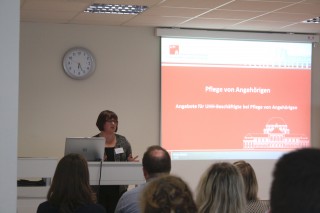It can happen very quickly: An accident or a fall, and a member of the family is in need for care. The need for care can occur during any period of life and in addition to the emotional stress, it confronts many family members with a series of organizational and legal problems. For employees, a further aggravating factor is the necessity to reconcile the care of a family member with their job. How to succeed in keeping the balance was explained by experts during the information evening „Vereinbarkeit von Beruf und Familie – Pflege von Angehörigen” (“How to balance family life and career – caring for family members with special needs”) which both clusters of excellence CUI and CliSAP in co-operation with the Family Services had invited to. “Also top-class research ought to be reconcilable with family life,“ CliSAP-spokesperson Professor Martin Claußen emphasized during his welcoming remarks.
 In fact, in year 2011 already two thirds of nearly 2.5 million persons in need of care (officially categorized according to German law) were cared for at home. About half of the ones being at home are getting professional support. The other half is cared for by a family member not trained for such a task, Martin Moritz summed up. The CEO of an independent school for family members (“Die Angehörigenschule”) and professional nurse explained very vividly the problems which occur and which can lead to considerable strain for the caring family members. His suggestions and hints to find financial and social relief were especially interesting for the about 40 participants. Many problems arise in the end from the lack of information – for example about topics like a durable power of attorney for health care and advanced health care directions. Among other things, Mr. Moritz also provided information about training opportunities free of charge and contacts for certain illnesses (f. g. dementia, multiple sclerosis, stroke, Parkinson’s disease). The aim is to prevent becoming a “lone fighter” and to master the family members’ needs within the tension of care and career, Mr. Moritz pointed out.
In fact, in year 2011 already two thirds of nearly 2.5 million persons in need of care (officially categorized according to German law) were cared for at home. About half of the ones being at home are getting professional support. The other half is cared for by a family member not trained for such a task, Martin Moritz summed up. The CEO of an independent school for family members (“Die Angehörigenschule”) and professional nurse explained very vividly the problems which occur and which can lead to considerable strain for the caring family members. His suggestions and hints to find financial and social relief were especially interesting for the about 40 participants. Many problems arise in the end from the lack of information – for example about topics like a durable power of attorney for health care and advanced health care directions. Among other things, Mr. Moritz also provided information about training opportunities free of charge and contacts for certain illnesses (f. g. dementia, multiple sclerosis, stroke, Parkinson’s disease). The aim is to prevent becoming a “lone fighter” and to master the family members’ needs within the tension of care and career, Mr. Moritz pointed out.
The situation is especially difficult for employees. Karin Diedrichs, Human Resources Development at Universität Hamburg, focused on home office and part-time teleworking and referred to the aged and nursing care guidelines of the university.
Irina Haan, responsible for hirings in third party funded projects at Universität Hamburg, presented the contractual possibilities (TV-L) – for example the reduction of working time due to family reasons and the times which are not taken into account as defined under WissZeitVG.
Prof. Britta Ramminger, Equal Opportunity Officer at Universität Hamburg, dealt with a persistent prejudice: “Nursing and caring for family members is not a genetic characteristic of solely women.” The qualified nurse additionally requested “creativity, flexibility and respect towards these who need support.”

